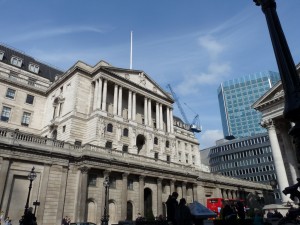
EspañolOne of the world’s oldest central banking institutions, the Bank of England (BoE), has released its report on digital currencies. In it the bank states digital currencies “do not currently pose a material risk to monetary or financial stability in the United Kingdom.”
The bank published its report on Thursday in its quarterly bulletin. Among its principal findings, the report highlights bitcoin’s distributed ledger as a “key innovation.”
“With conventional bank deposits, banks hold the digital record and are trusted to ensure its validity. With digital currencies, by contrast, the ledger containing the record of all transactions by all users is publicly available to all,” state BoE analysts in their report. “Rather than requiring users to have trust in special institutions, reliance is placed on the network and the rules established to reliably change the ledger.”
The bank reviews basic economic notions of money and concludes that “in theory, digital currencies could serve as money for anybody with an internet-enabled computer or device.” However, due to current adoption levels and high price volatility, the bank is not ready to categorize bitcoin as a “currency.”
The report also draws attention to the low transaction fees associated with digital currencies. According to the analysis, this features is the “primary driver of interest from retailers accepting them in payment.” Nevertheless, the bank believes this could change. The decentralized nature of the bitcoin network — in contrast to centralized payment systems that take advantage of scale operations — coupled with increased usage, may mean a rise in transaction fees.
“While the marginal costs for traditional payment systems may be expected to remain broadly constant over time, those incurred by digital currency miners may be expected to rise as their usage increases and — in addition to that — to increase over time because of an incentive for overinvestment in new equipment,” predicts the report.
The bank estimates that there is less than £60 million (US$98 million) worth of bitcoins circulating within the UK economy, which amounts to less than 0.1 percent of sterling notes and coin and only 0.003 percent of broad money balances.
While the report raising concerns regarding the stability of digital currencies, BoE notes the potential bitcoin and other cryptocurrencies: “Both digital currencies’ status as money and the distributed ledger technology used by them have potential to develop over time.”
Source: Bank of England.
 Versión Español
Versión Español












